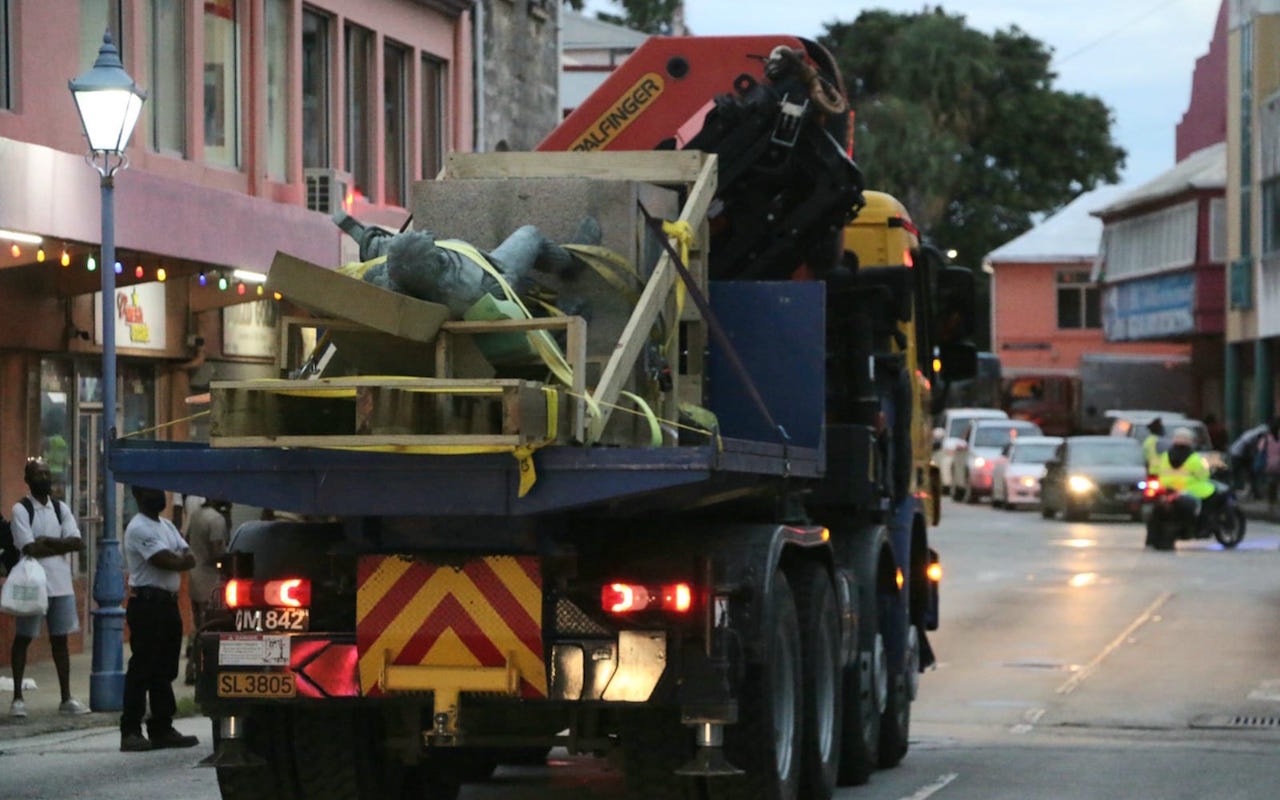On the evening of November 16, 2020, the statue of Horatio Lord Nelson was taken from its pedestal in the former Trafalgar Square in Bridgetown where it had stood for 207 years. Once the Square had been renamed Heroes Square, it was clear that Horatio Nelson had no legitimate place at its centre. What was amazing was that having made the change in nomenclature, it should have taken so long to move the monument. Horatio Nelson was and remains a British Naval Hero of great repute. He was not, however, and should not be considered a Barbadian hero.
Horatio Nelson opposed the abolition of the Trans-Atlantic slave trade and slavery. He opposed John Wesley, who in 1775 had published his ‘Thoughts on Slavery’ condemning the institution of slavery. Nelson railed against William Wilberforce who he called ‘that damnable abolitionist’ and stated “I have ever been and shall die a firm friend to our present colonial system.” He was on the wrong side of history. Such a man cannot be a hero to the descendants of slaves unless those descendants are totally and painfully ignorant of their patrimony.
Some may see the removal of Nelson as simply a response to a vocal minority. One should be aware that it may well be part of a larger legitimate movement that reflects a changing iconography with regard to ostensibly ‘heroic’ figures such as the Admiral.
In England itself, the National Maritime Museum at Greenwich is reviewing the roles of several British Admirals including Horatio Nelson in the light of what it calls ‘the barbaric story of race, colonialism and representation in British Maritime History.’ The other famed naval heroes of that time who are coming under review in the Museum of Britain’s imperial past include Admiral Edward Pellew, Admiral Sir William Sidney Smith, Admiral James de Saumarez and Captain William Peel, son of the more famous Sir Robert Peel.
Pellew, who is memorialised in the Hornblower novels, oversaw British operations in the East Indies, the North Sea and the Mediterranean. Smith defeated Napoleon Bonaparte at the Siege of Acre. Bonaparte is reported to have said of Smith, ‘that man made me miss my destiny.’ Captain William Peel is known for his ruthless suppression of the Indian Mutiny in 1857.
All of these have assured places in the pantheon of British Naval icons, but seen from the perspective of the colonial oppressed, their place is questionable and it is significant that the curators of the British Maritime Museum are now recognising this.
When the statue of the slave trader Edward Colston was toppled in Bristol, the Director of the Greenwich Naval Museum told staff that the reassessment of history would provide a ‘moment to shine.’ The Sunday Telegraph in an article entitled “Legacy Review could knock Nelson off his pedestal” reports that in the light of the Black Lives Matter movement, the Museum had decided to “make changes to its repository of naval treasures and address aspects of slavery relating to the Royal Navy.”
We must understand that in the light of the George Floyd incident and the persistence of blatant racism, black people and others of good will are making a legitimate effort to reassess the history of Negro enslavement and its pejorative effects on human society.
There are those, black and white, who would say, ‘Forget all that….. That’s all in the past.’ Well, not quite. Recent events in the United States have shown how the past pursues black people into the present and threatens even in an age of supposed enlightenment to confront them in the future.
Many assumed that with Obama’s election to the US presidency, America had entered a ‘post-racial’ era. How ridiculous that assumption now seems. Black Barbadians, because they were in the majority, have not grown up with that injured sense of being black, of being persecuted. White Barbadians, in spite of whatever racial reservations they may hold and the maintenance of a sense of distancing from blacks, do not, I think, want to wilfully persecute black Barbadians. We would want to guard against such an eventuality as much as one would guard against those who would want to perpetually ‘look back in anger’ and wield their cudgels with malice to the destruction of all.
Two ironies have recently struck me. One is that with all the fuss about History, that academic discipline is being increasingly pre-empted from the school curriculum in favour of subjects, supposedly more ‘utilitarian.’
Another thing. On the day that Nelson was taken down, the Nation Newspaper highlighted the plight of a Barbadian black man, David Bourne, who was dislodged from the piece of land he was cultivating at Maxwell, dislodged by the new Chinese owners of the property to house Chinese immigrants. These fields and hills, you say.
Ralph Jemmott is a respected retired educator.




